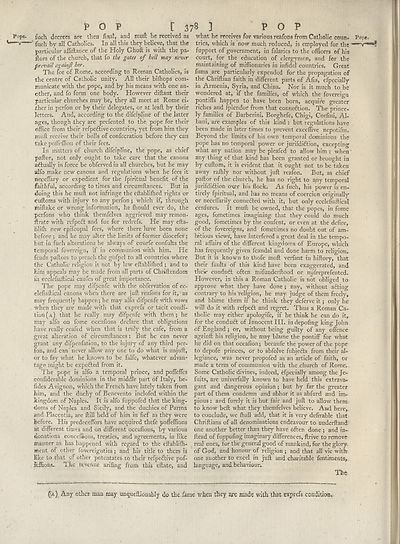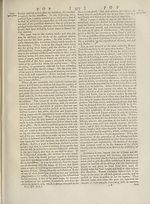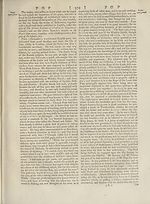Encyclopaedia Britannica > Volume 15, PLA-RAM
(422) Page 378
Download files
Complete book:
Individual page:
Thumbnail gallery: Grid view | List view

IP O P
K>pe. fucTK decrees are then final, and rmifl be received as
—y—■' fuch by all Catholics. In all this they believe, that the
particular afliftance of the Holy Ghoft is with the pa¬
llors of the church, that fo the gates of hell may never
prevail againjl her.
The fee of Rome, according to Roman Catholics, is
the centre of Catholic unity. All their bifhops com¬
municate with the pope, and by his means with one an¬
other, and fo form one body. However dillant their
particular churches may be, they all meet at Rome ei¬
ther in perfon or by their delegates, or at leall by their
letters. And, according to the difeipline of the latter
ages, though they are prefented to the pope for their
office from their refpeftive countries, yet from him they
mull receive their bulls of confecration before they can
take poffeffion of their fees.
In matters of church difeipline, the pope, as chief
pallor, not only ought to take care that the canons
aftually in force be obferved in all churches, but he may
alfo make new canons and regulations when he fees it
neceflary or expedient for the fpiritual benefit of the
faithful, according to times and circumftances. But in
doing this he mull not infringe the ellablilhed rights or
cultoms with injury to any perfon ; which if, through
millake or wrong information, he fhould ever do, the
perfons who think themfelves aggrieved may remon-
11 rate with refpeft and fue for redrefs. He may efta-
blifh new epifcopal fees, where there have been none
before ; and he may alter the limits of former diocefes ;
but in fuch alterations he always of courfe confults the
temporal fovereign, if in communion with him. He
fends pallors to preach the gofpel to all countries where
the Catholic religion is not by law ellablilhed ; and to
him appeals may be made from all parts of Chriltendom
in ecclefiallical caufes of great importance.
The pope may difpenfe with the obfervation of ec-
clefiaflieal canons when there are juft reafons for it, as
may frequently happen; he may alfo difpenfe with vows
when they are made with that exprefs or tacit condi¬
tion ( a ) that he really may difpenfe with them ; he
may alfo on fome occafions declare that obligations
have really ceafed when that is truly the cafe, from a
great alteration of circumftances : But he can never
grant any difpenfation, to the injury of any third per¬
fon, and can never allow any one to do what is unjuft,
or to fay what he knows to be falfe, whatever advan¬
tage might be expedled from it.
The pope is alfo a temporal prince, and poffelTes
■confiderable dominions in the middle part of Italy, be-
lides Avignon, which the French have lately taken from
him, and the duchy'- of Benevento inclofed wdthin the
kingdom of Naples. It is alfo fuppofed that the king¬
doms of Naples and Sicily, and the duchies of Parma
and Placentia, are ftill held of him in fief as they were
before. His predecelfors have acquired thefe polfeffions
at different times and on different occafions, by various
donations concefSons, treaties, and agreements, in like
manner as has happened with regard to the eftablifh-
ment of other fovereignties; and his title to them is
like to that of other potentates to their refpedtive pof-
ieffions. The revenue arifing from this eftate, and
[ 378 1
POP
what he receives for various reafons from Catholic coun¬
tries, which is now much reduced, is employed for the '
fupport of government, in falaries to the officers of his
court, for the education of clergymen, and for the
maintaining of miffionaries in infidel countries. Great
fums are particularly expended for the propagation of
the Chriftian faith in different parts of Afia, efpecially
in Armenia, Syria, and China. Nor is it much to be
wondered at, if the families, of wdiich the fovereign
pontiffs happen to have been born, acquire greater
riches and fplendor from that conneftion. The prince¬
ly families of Barberini, Borghefe, Chigi, Corfini, Al-
bani, are examples of this kind : but regulations have
been made in later times to prevent exceffive nepotifm.
Beyond the limits of his owm temporal dominions the
pope has no temporal power or jurifdidtion, excepting
what any nation may be pleafed to allow' him : when'
any thing of that kind has been granted or brought in
by cuftom, it is evident that it ought not to be taken
aw-ay ralhly nor without juft reafon. But, as chief
pallor of the church, he has no right to any temporal
jurifdi&ion ovjer his flock. As fuch, his pow'er is en¬
tirely' fpiritual, and has no means of coercion originally
or neceffarily connedled with it, but only ecclefiaftical
cenfures. It muft be owned, that the popes, in fome
ages, fometimes imagining that they could do much
good, fometimes by the confent, or even at the defire,
of the fovereigns, and fometimes no doubt out of am¬
bitious views', have interfered a great deal in the tempo¬
ral affairs of the different kingdoms of Europe, which
has frequently given fcandal and done harm to religion.
But it is known to thofe moft verfant in hiftory, that
their faults of this kind have been exaggerated, and
their conduft often mifunderftood or mifreprefented.
However, in this a Roman Catholic is not obliged to
approve wdrat they have done ; nay, without acting
contrary to his religion, he may judge of them freely,
and blame them if he think they deferve it ; only he
wall do it w'ith refpedt and regret. Thus a Roman Ca¬
tholic may either apologife, if he think he can do it,
for the conduct of Innocent III. in depofing king John
of England ; or, without being guilty of any offence
again!! his religion, he may blame the pontiff for w'hat
he did on that occafion; becaufe the power of the pope
to depofe princes, or to abfolve fubjefts from their al¬
legiance, w'as never propofed as an article of faith, or
made a term of communion with the church of Rome.
Some Catholic divines, indeed, efpecially among the Je-
fuits, are univerfally known to have held this extrava¬
gant and dangerous opinion ; but by far the greater
part of them condemn and abhor it as abfurd and im¬
pious : and furely it is but fair and juft to allow them
to know bell what they themfelves believe. And here,
to conclude, we fhall add, that it is very' definable that
Chriftians of all denominations endeavour to underftand
one another better than they' have often done ; and in-
llead of fuppofing imaginary differences, ftrive to remove
real ones, for the general good of mankind, for the glory-
of God, and honour of religion ; and that all vie wfithr
one another to excel in juft and charitable fentiments,
language, and behaviour.
The
Pope.
(•a) Any other man may unqueftionably do the fame when they axe made with that exprefs condition
K>pe. fucTK decrees are then final, and rmifl be received as
—y—■' fuch by all Catholics. In all this they believe, that the
particular afliftance of the Holy Ghoft is with the pa¬
llors of the church, that fo the gates of hell may never
prevail againjl her.
The fee of Rome, according to Roman Catholics, is
the centre of Catholic unity. All their bifhops com¬
municate with the pope, and by his means with one an¬
other, and fo form one body. However dillant their
particular churches may be, they all meet at Rome ei¬
ther in perfon or by their delegates, or at leall by their
letters. And, according to the difeipline of the latter
ages, though they are prefented to the pope for their
office from their refpeftive countries, yet from him they
mull receive their bulls of confecration before they can
take poffeffion of their fees.
In matters of church difeipline, the pope, as chief
pallor, not only ought to take care that the canons
aftually in force be obferved in all churches, but he may
alfo make new canons and regulations when he fees it
neceflary or expedient for the fpiritual benefit of the
faithful, according to times and circumftances. But in
doing this he mull not infringe the ellablilhed rights or
cultoms with injury to any perfon ; which if, through
millake or wrong information, he fhould ever do, the
perfons who think themfelves aggrieved may remon-
11 rate with refpeft and fue for redrefs. He may efta-
blifh new epifcopal fees, where there have been none
before ; and he may alter the limits of former diocefes ;
but in fuch alterations he always of courfe confults the
temporal fovereign, if in communion with him. He
fends pallors to preach the gofpel to all countries where
the Catholic religion is not by law ellablilhed ; and to
him appeals may be made from all parts of Chriltendom
in ecclefiallical caufes of great importance.
The pope may difpenfe with the obfervation of ec-
clefiaflieal canons when there are juft reafons for it, as
may frequently happen; he may alfo difpenfe with vows
when they are made with that exprefs or tacit condi¬
tion ( a ) that he really may difpenfe with them ; he
may alfo on fome occafions declare that obligations
have really ceafed when that is truly the cafe, from a
great alteration of circumftances : But he can never
grant any difpenfation, to the injury of any third per¬
fon, and can never allow any one to do what is unjuft,
or to fay what he knows to be falfe, whatever advan¬
tage might be expedled from it.
The pope is alfo a temporal prince, and poffelTes
■confiderable dominions in the middle part of Italy, be-
lides Avignon, which the French have lately taken from
him, and the duchy'- of Benevento inclofed wdthin the
kingdom of Naples. It is alfo fuppofed that the king¬
doms of Naples and Sicily, and the duchies of Parma
and Placentia, are ftill held of him in fief as they were
before. His predecelfors have acquired thefe polfeffions
at different times and on different occafions, by various
donations concefSons, treaties, and agreements, in like
manner as has happened with regard to the eftablifh-
ment of other fovereignties; and his title to them is
like to that of other potentates to their refpedtive pof-
ieffions. The revenue arifing from this eftate, and
[ 378 1
POP
what he receives for various reafons from Catholic coun¬
tries, which is now much reduced, is employed for the '
fupport of government, in falaries to the officers of his
court, for the education of clergymen, and for the
maintaining of miffionaries in infidel countries. Great
fums are particularly expended for the propagation of
the Chriftian faith in different parts of Afia, efpecially
in Armenia, Syria, and China. Nor is it much to be
wondered at, if the families, of wdiich the fovereign
pontiffs happen to have been born, acquire greater
riches and fplendor from that conneftion. The prince¬
ly families of Barberini, Borghefe, Chigi, Corfini, Al-
bani, are examples of this kind : but regulations have
been made in later times to prevent exceffive nepotifm.
Beyond the limits of his owm temporal dominions the
pope has no temporal power or jurifdidtion, excepting
what any nation may be pleafed to allow' him : when'
any thing of that kind has been granted or brought in
by cuftom, it is evident that it ought not to be taken
aw-ay ralhly nor without juft reafon. But, as chief
pallor of the church, he has no right to any temporal
jurifdi&ion ovjer his flock. As fuch, his pow'er is en¬
tirely' fpiritual, and has no means of coercion originally
or neceffarily connedled with it, but only ecclefiaftical
cenfures. It muft be owned, that the popes, in fome
ages, fometimes imagining that they could do much
good, fometimes by the confent, or even at the defire,
of the fovereigns, and fometimes no doubt out of am¬
bitious views', have interfered a great deal in the tempo¬
ral affairs of the different kingdoms of Europe, which
has frequently given fcandal and done harm to religion.
But it is known to thofe moft verfant in hiftory, that
their faults of this kind have been exaggerated, and
their conduft often mifunderftood or mifreprefented.
However, in this a Roman Catholic is not obliged to
approve wdrat they have done ; nay, without acting
contrary to his religion, he may judge of them freely,
and blame them if he think they deferve it ; only he
wall do it w'ith refpedt and regret. Thus a Roman Ca¬
tholic may either apologife, if he think he can do it,
for the conduct of Innocent III. in depofing king John
of England ; or, without being guilty of any offence
again!! his religion, he may blame the pontiff for w'hat
he did on that occafion; becaufe the power of the pope
to depofe princes, or to abfolve fubjefts from their al¬
legiance, w'as never propofed as an article of faith, or
made a term of communion with the church of Rome.
Some Catholic divines, indeed, efpecially among the Je-
fuits, are univerfally known to have held this extrava¬
gant and dangerous opinion ; but by far the greater
part of them condemn and abhor it as abfurd and im¬
pious : and furely it is but fair and juft to allow them
to know bell what they themfelves believe. And here,
to conclude, we fhall add, that it is very' definable that
Chriftians of all denominations endeavour to underftand
one another better than they' have often done ; and in-
llead of fuppofing imaginary differences, ftrive to remove
real ones, for the general good of mankind, for the glory-
of God, and honour of religion ; and that all vie wfithr
one another to excel in juft and charitable fentiments,
language, and behaviour.
The
Pope.
(•a) Any other man may unqueftionably do the fame when they axe made with that exprefs condition
Set display mode to:
![]() Universal Viewer |
Universal Viewer | ![]() Mirador |
Large image | Transcription
Mirador |
Large image | Transcription
Images and transcriptions on this page, including medium image downloads, may be used under the Creative Commons Attribution 4.0 International Licence unless otherwise stated. ![]()
| Encyclopaedia Britannica > Encyclopaedia Britannica > Volume 15, PLA-RAM > (422) Page 378 |
|---|
| Permanent URL | https://digital.nls.uk/191906262 |
|---|
| Attribution and copyright: |
|
|---|
| Description | Ten editions of 'Encyclopaedia Britannica', issued from 1768-1903, in 231 volumes. Originally issued in 100 weekly parts (3 volumes) between 1768 and 1771 by publishers: Colin Macfarquhar and Andrew Bell (Edinburgh); editor: William Smellie: engraver: Andrew Bell. Expanded editions in the 19th century featured more volumes and contributions from leading experts in their fields. Managed and published in Edinburgh up to the 9th edition (25 volumes, from 1875-1889); the 10th edition (1902-1903) re-issued the 9th edition, with 11 supplementary volumes. |
|---|---|
| Additional NLS resources: |
|

